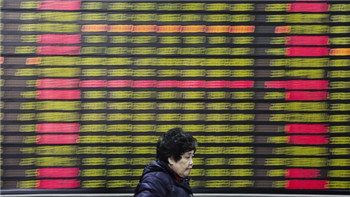(单词翻译:单击)

Actions, we are told, speak louder than words. If so, then China looks in good shape. Yesterday, the country’s markets reopened after the week-long Chinese new year holiday. While China was closed, Japan’s equity markets slumped one-tenth in US dollar terms, and the Japanese yen surged.
人们常说,行动比言语更响亮。如果是这样,那么中国看起来状态不错。昨日,中国市场在春节黄金周过后重新开盘。在中国市场关闭的上周,日本股市按美元计算大跌十分之一,而日元飙升。
Yet Shanghai’s return did not exacerbate the regional sell-off: the index opened down 3 per cent then rallied through the day. The renminbi, meanwhile, had its strongest bounce since 2005, up more than 1 per cent, especially curious after January trade data highlighted China’s poor economy. Exports fell more than one-tenth year-on-year, overshooting the anticipated 2 per cent drop. Imports, meanwhile, contracted one-fifth in US dollar terms — again, far worse than forecast.
然而,上海股市在开盘后并没有加剧地区抛售:指数开盘下跌3%后在当日余下时间呈现涨势。与此同时,人民币汇率出现自2005年以来最强劲的反弹,涨幅超过1%;在1月份贸易数据突显中国经济状况欠佳后,这尤其令人费解。按美元计算,出口同比下降逾十分之一,降幅远超预期的2%,进口减少五分之一,同样远逊于预测。
These figures say more about the parlous state of the external situation than they do about China — exports to the EU, among others, were particularly poor. And while the import figure suggests a slowdown in internal demand, it was unduly influenced by collapsing commodity prices. Iron ore imports, for instance, grew 5 per cent in volume terms but dropped one-third in value terms, according to HSBC.
这些数字在更大程度上说明了外部形势的严峻,而非中国国内的局面——其中对欧盟的出口表现特别糟糕。同时,尽管进口数据似乎表明内需放缓,但它受到了大宗商品价格崩盘的较大影响。据汇丰(HSBC)介绍,以铁矿石为例,中国进口量增长了5%,但在价值上降低了三分之一。
Other parts of China’s domestic economy are doing just fine. Chinese new year spending on food and retail rose 11 per cent year-on-year, according to the Ministry of Finance. Leisure pursuits, in the consumer-driven economy, fared even better. Cinema box office take rose 80 per cent year-on-year for the first three days of the holiday, equalling revenues for the entire week-long holiday last year.
中国国内经济的其他部分表现不错。根据中国商务部的数据,春节黄金周全国零售和餐饮销售额同比增长11%。在消费拉动型经济中,休闲娱乐活动表现更佳。初一到初三全国电影票房同比增长80%,相当于去年春节黄金周的总票房。
And people travelled, too: visitors to domestic attractions such as Chengdu’s panda reserve rose more than two-fifths.
人们也积极外出旅游。国内景点游客人数增加,比如初五成都大熊猫基地的游客人数就增加了逾五分之二。
Despite these encouraging signs, Zhou Xiaochuan, People’s Bank of China governor, made the difference. Over the weekend, he calmed fears of currency devaluation and capital controls. Perhaps words carry more weight than actions after all.
尽管有这些令人鼓舞的迹象,但起到决定性作用的还是中国人民银行(PBoC)行长周小川。上周末,他安抚了外界对于人民币贬值和资本管制的担忧。也许言语最终还是比行动更有份量。


